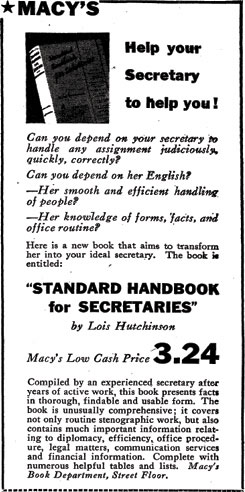RE-MEMBERING IDENTITY
|
||
| ( 6 ) | ||
"Consider . . . Lev Vygotsky, who saw externally mediated memory systems, like those of writing, as a matter of the revolutionary reorganization of memory...."
|
Memory Vertical filing systems changed the way corporations "remembered" by offering a workable technology for organizing and storing the growing mountain of letters and memoranda being churned out by legions of typists and secretaries. As the term "memorandum" itself suggests, clerical workers were engaged in organizational memory work almost from the start. Career advice emphasized the importance of the secretary's memory in three ways: internal (mental) memory, external memory, and muscle memory. The memory work of the secretary was seen as important—her ability to remember names, faces, and details related to her employers' work were an essential part of her job. A 1937 secretarial handbook by Lois Hutchinson (1936) offers the following advice for improving memory: "The best method of remembering is by association of ideas. Analyze things and translate them into familiar terms. Read a meaning into everything—a reason. Meaningless things cannot be remembered. . . . If a real interest is created in the papers that pass through an office—in what they are doing to further or hinder the work—it will be easy to remember them, even thought they have to be handled rapidly." (Hutchinson, 1936, p. 449) This advice seems straightforward, but it's worth noting that in the process of asking her reader to remember, Hutchinson is asking her to engage the work in deeper ways, to "analyze things" so that she can more easily develop mental hooks upon which to hang information. Even typists (considered less skilled than secretaries) might be asked to learn and remember specialized terminology. Hutchinson also suggests using "automatic" memory, which involves placing objects in positions that will, when you encounter them, "automatically" remind you to attend to the tasks associated with those objects (e.g., placing a letter that needs to be dropped in the mail next to your gloves). The importance placed on memory had to do with the secretary's role as a mediator of information flow and activity within and between offices. She needed to "remember" (for herself and her employer) in order to keep those around her happy and keep the office running smoothly. This memory work thus took the forms of emotional and organizational work, as they remembered names, dates, and details related to their employers and the company's customers.
|
|
